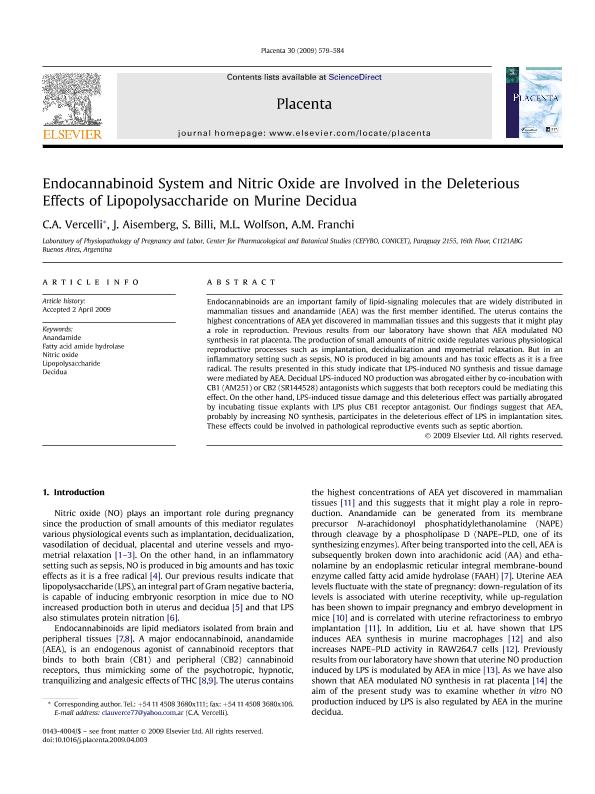Artículo
Endocannabinoid System and Nitric Oxide are Involved in the Deleterious Effects of Lipopolysaccharide on Murine Decidua
Vercelli, Claudia Alejandra ; Aisemberg, Julieta
; Aisemberg, Julieta ; Billi, Silvia Cristina
; Billi, Silvia Cristina ; Wolfson, Manuel Luis
; Wolfson, Manuel Luis ; Franchi, Ana Maria
; Franchi, Ana Maria
 ; Aisemberg, Julieta
; Aisemberg, Julieta ; Billi, Silvia Cristina
; Billi, Silvia Cristina ; Wolfson, Manuel Luis
; Wolfson, Manuel Luis ; Franchi, Ana Maria
; Franchi, Ana Maria
Fecha de publicación:
07/2009
Editorial:
W B Saunders Co Ltd
Revista:
Placenta
ISSN:
0143-4004
Idioma:
Inglés
Tipo de recurso:
Artículo publicado
Clasificación temática:
Resumen
Endocannabinoids are an important family of lipid-signaling molecules that are widely distributed in mammalian tissues and anandamide (AEA) was the first member identified. The uterus contains the highest concentrations of AEA yet discovered in mammalian tissues and this suggests that it might play a role in reproduction. Previous results from our laboratory have shown that AEA modulated NO synthesis in rat placenta. The production of small amounts of nitric oxide regulates various physiological reproductive processes such as implantation, decidualization and myometrial relaxation. But in an inflammatory setting such as sepsis, NO is produced in big amounts and has toxic effects as it is a free radical. The results presented in this study indicate that LPS-induced NO synthesis and tissue damage were mediated by AEA. Decidual LPS-induced NO production was abrogated either by co-incubation with CB1 (AM251) or CB2 (SR144528) antagonists which suggests that both receptors could be mediating this effect. On the other hand, LPS-induced tissue damage and this deleterious effect was partially abrogated by incubating tissue explants with LPS plus CB1 receptor antagonist. Our findings suggest that AEA, probably by increasing NO synthesis, participates in the deleterious effect of LPS in implantation sites. These effects could be involved in pathological reproductive events such as septic abortion.
Archivos asociados
Licencia
Identificadores
Colecciones
Articulos(CEFYBO)
Articulos de CENTRO DE ESTUDIOS FARMACOLOGICOS Y BOTANICOS
Articulos de CENTRO DE ESTUDIOS FARMACOLOGICOS Y BOTANICOS
Articulos(IBIOBA - MPSP)
Articulos de INST. D/INV.EN BIOMED.DE BS AS-CONICET-INST. PARTNER SOCIEDAD MAX PLANCK
Articulos de INST. D/INV.EN BIOMED.DE BS AS-CONICET-INST. PARTNER SOCIEDAD MAX PLANCK
Articulos(IIB-INTECH)
Articulos de INST.DE INVEST.BIOTECNOLOGICAS - INSTITUTO TECNOLOGICO CHASCOMUS
Articulos de INST.DE INVEST.BIOTECNOLOGICAS - INSTITUTO TECNOLOGICO CHASCOMUS
Citación
Vercelli, Claudia Alejandra; Aisemberg, Julieta; Billi, Silvia Cristina; Wolfson, Manuel Luis; Franchi, Ana Maria; Endocannabinoid System and Nitric Oxide are Involved in the Deleterious Effects of Lipopolysaccharide on Murine Decidua; W B Saunders Co Ltd; Placenta; 30; 7; 7-2009; 579-584
Compartir
Altmétricas



